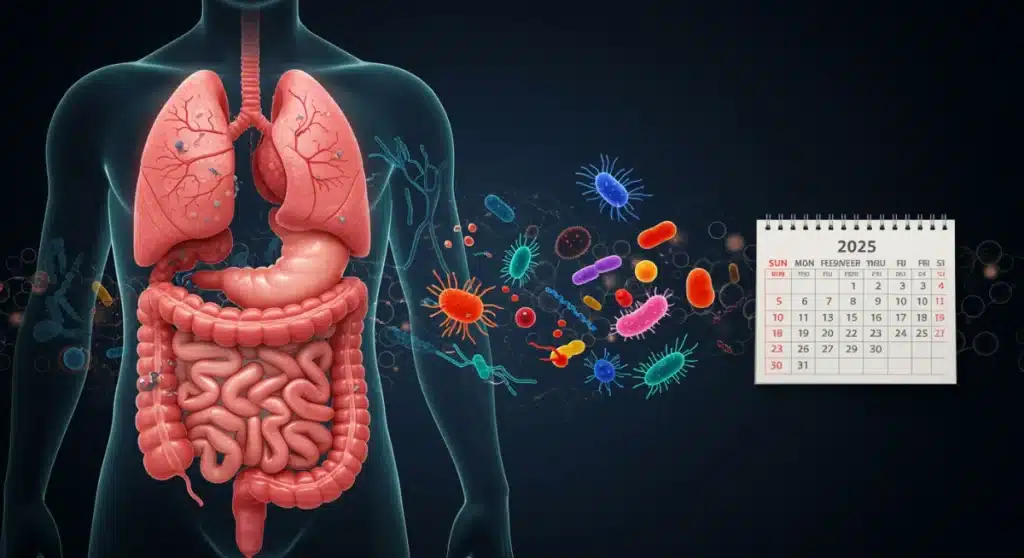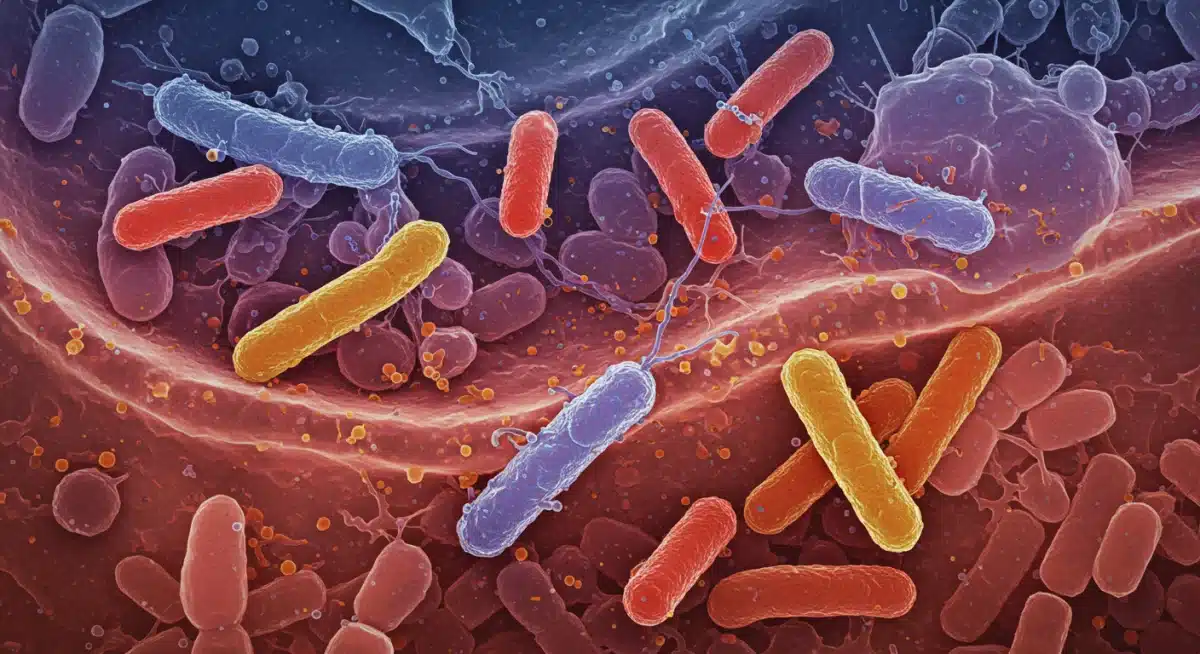Probiotic Research 2025: Digestive Health Discoveries & Updates

The latest in probiotic research for 2025 unveils significant breakthroughs in personalized gut health strategies, extending their impact beyond digestion to areas like mental well-being and immune system modulation.
As we navigate the complexities of modern health, the spotlight on our gut continues to intensify. The Latest in Probiotic Research: 2025 Discoveries for Digestive Health (RECENT UPDATES) reveals that the future of wellness is deeply intertwined with the microscopic world within us. This year’s scientific endeavors are not just confirming what we suspected but are unearthing truly transformative insights into how these beneficial microorganisms can redefine our health.
Understanding the Evolving Probiotic Landscape
The field of probiotics has exploded in recent years, moving far beyond generic yogurt claims. Today, researchers are meticulously cataloging and understanding specific strains, their functions, and their intricate interactions within the human body. This granular approach is paving the way for highly targeted interventions, shifting from a one-size-fits-all model to personalized probiotic therapies.
The focus in 2025 is increasingly on the ecological balance of the gut microbiome, recognizing that it’s not just about introducing beneficial bacteria, but fostering an environment where they can thrive and exert their positive effects. This involves a holistic view of diet, lifestyle, and environmental factors alongside probiotic supplementation.
Precision Probiotics: Beyond Broad-Spectrum
Early probiotic products often relied on broad-spectrum formulations, assuming a general benefit. However, 2025 research emphasizes the need for precision. Scientists are now able to identify specific bacterial strains that address particular health concerns, leading to more effective and evidence-based applications.
- Strain-Specific Efficacy: Understanding which strains target specific conditions like IBS, mood disorders, or immune deficiencies.
- Genomic Sequencing: Advanced techniques to map the genetic makeup of individual bacterial strains, predicting their metabolic pathways and functions.
- Bioinformatics Integration: Using powerful computational tools to analyze vast datasets of microbiome information, identifying patterns and potential therapeutic targets.
This shift towards precision means that consumers will increasingly encounter products designed for very specific health outcomes, rather than general gut support. The days of simply picking up a probiotic without understanding its specific components are slowly fading, replaced by a more informed and targeted approach to supplementation.
In conclusion, the evolving probiotic landscape is characterized by a move towards greater specificity and a deeper understanding of microbial ecology. This scientific progression is essential for unlocking the full therapeutic potential of probiotics and ensuring their effective application in personalized health strategies.
The Gut-Brain Axis: New Dimensions of Mental Wellness
One of the most captivating areas of probiotic research in 2025 continues to be the gut-brain axis. Scientists are now unravelling the complex communication pathways between the gut microbiome and the central nervous system, revealing profound implications for mental health and cognitive function. This bidirectional highway of signals, hormones, and neurotransmitters is proving to be a critical determinant of our emotional and psychological states.
Groundbreaking studies are demonstrating how specific probiotic strains can influence mood, reduce anxiety, and even improve cognitive performance. This opens up entirely new avenues for managing mental health conditions, potentially offering complementary or alternative approaches to traditional therapies. The focus is not just on alleviating symptoms, but on understanding the underlying microbial imbalances that might contribute to neurological dysregulation.
Psychobiotics: Targeting Mood and Cognition
The term psychobiotics has gained significant traction, referring to probiotics that confer mental health benefits. Research in 2025 is identifying specific psychobiotic strains capable of producing neurotransmitters or influencing their precursors, thereby impacting brain chemistry.
- Serotonin Production: Certain gut bacteria are known to produce serotonin, a key neurotransmitter involved in mood regulation.
- GABA Synthesis: Other strains can produce GABA, an inhibitory neurotransmitter that helps calm the nervous system and reduce anxiety.
- Inflammation Reduction: Psychobiotics can also reduce systemic inflammation, which is increasingly linked to depression and other mental health disorders.
These findings suggest that a healthy gut microbiome might be as crucial for mental well-being as it is for physical health. The integration of psychobiotic strategies into mental health care is an exciting prospect, offering a more holistic approach to conditions that have long been challenging to treat effectively.
Ultimately, the advancements in understanding the gut-brain axis underscore the interconnectedness of our biological systems. Probiotics are emerging as powerful tools not just for digestive comfort, but for fostering a resilient and balanced mind, marking a significant shift in mental wellness paradigms.

Beyond Digestion: Probiotics and Systemic Health
While historically associated primarily with digestive health, 2025 research is firmly establishing probiotics as key players in systemic health. Their influence extends far beyond the gut, impacting various bodily systems and processes, from immune function to metabolic health and even skin conditions. This broader understanding highlights the gut microbiome as a central regulator of overall well-being, influencing health outcomes across the entire body.
Scientists are uncovering intricate mechanisms by which probiotics modulate immune responses, produce beneficial metabolites, and interact with host cells in distant organs. This holistic view of probiotic action is leading to innovative applications in preventative medicine and the management of chronic diseases that were previously not directly linked to gut health.
Immune System Modulation and Allergy Prevention
The gut houses a significant portion of the body’s immune cells, making the microbiome a critical modulator of immune responses. New research in 2025 demonstrates how specific probiotic strains can fine-tune the immune system, reducing inflammatory responses and potentially preventing allergic reactions.
- Th1/Th2 Balance: Certain probiotics help balance the Th1 and Th2 immune responses, crucial for managing allergies and autoimmune conditions.
- Immunoglobulin Production: They can stimulate the production of immunoglobulins, enhancing the body’s defense against pathogens.
- Barrier Function Enhancement: Probiotics strengthen the gut barrier, preventing harmful substances from entering the bloodstream and triggering systemic inflammation.
Furthermore, studies are exploring the role of maternal probiotic supplementation in influencing the immune development of infants, potentially reducing the risk of allergies and asthma later in life. This preventative aspect underscores the long-term health benefits of a well-supported microbiome.
In summary, the expanding understanding of probiotics’ systemic effects is reshaping our approach to health. Their ability to influence immune function, metabolism, and beyond positions them as versatile therapeutic agents for a wide array of conditions, moving them from niche supplements to mainstream health solutions.
Personalized Probiotic Therapies: The Future is Tailored
The concept of personalized medicine has found a fertile ground in probiotic research for 2025. Gone are the days of generic recommendations; the future of probiotic therapy is increasingly tailored to an individual’s unique microbiome composition, genetic predispositions, and specific health goals. This bespoke approach promises to maximize efficacy and minimize trial-and-error, making probiotic interventions far more precise and impactful.
Advanced diagnostic tools, including comprehensive microbiome sequencing and metabolic profiling, are enabling clinicians to gain unprecedented insights into a patient’s gut ecosystem. This data then informs the selection of specific probiotic strains or combinations, alongside dietary and lifestyle recommendations, to create a truly individualized intervention strategy.
Microbiome Mapping and AI-Driven Recommendations
One of the most exciting developments is the integration of artificial intelligence (AI) with microbiome mapping. AI algorithms can analyze vast amounts of data from an individual’s gut microbiome, identifying imbalances and predicting the most effective probiotic strains or prebiotics to restore equilibrium.
- Next-Generation Sequencing: High-throughput sequencing technologies provide detailed snapshots of microbial diversity and abundance.
- Metabolomic Analysis: Identifying the unique metabolic byproducts of an individual’s gut bacteria, offering clues about their functional activity.
- Predictive Modeling: AI platforms use this data to predict how different probiotic interventions will impact an individual’s health, offering personalized recommendations.
This level of personalization ensures that probiotic therapies are not just effective, but also highly efficient, targeting the root causes of health issues rather than merely addressing symptoms. The collaborative effort between diagnostics and AI is setting a new standard for precision health, making personalized probiotic strategies a reality.
In essence, personalized probiotic therapies represent a paradigm shift in how we approach gut health. By leveraging cutting-edge technology and a deep understanding of individual biology, these tailored interventions are poised to deliver unprecedented health benefits, making the future of wellness truly personal.
Probiotics in Clinical Practice: Integration and Evidence
As the scientific evidence for probiotics continues to mount, their integration into mainstream clinical practice is accelerating in 2025. Healthcare professionals are increasingly recognizing the therapeutic potential of specific probiotic strains for a range of conditions, moving beyond anecdotal evidence to embrace rigorously tested and clinically validated applications. This shift is driven by a growing body of high-quality research and a clearer understanding of how to effectively incorporate probiotics into treatment protocols.
Collaboration between researchers, clinicians, and industry is fostering the development of standardized guidelines and best practices for probiotic use. This ensures that patients receive appropriate strains, dosages, and durations of therapy, maximizing benefits while minimizing potential risks. The emphasis is on evidence-based recommendations, moving away from a generalized approach to a more targeted and informed application within medical settings.
Therapeutic Applications and Emerging Guidelines
Probiotics are now being explored for their therapeutic potential in diverse clinical areas, with emerging guidelines providing clarity for healthcare providers. These guidelines are crucial for ensuring safe and effective use, especially in vulnerable populations or those with complex health conditions.
- Irritable Bowel Syndrome (IBS): Specific strains are showing promise in alleviating symptoms like bloating, pain, and altered bowel habits.
- Antibiotic-Associated Diarrhea (AAD): Certain probiotics are well-established for preventing and treating AAD, protecting the gut microbiome during antibiotic use.
- Inflammatory Bowel Disease (IBD): Research is exploring the role of probiotics in managing flares and maintaining remission in conditions like Crohn’s disease and ulcerative colitis.
Furthermore, studies are investigating their utility in metabolic syndrome, cardiovascular health, and even certain types of cancer, often as an adjunct to conventional treatments. The growing body of evidence is transforming probiotics from supplements to legitimate therapeutic agents in the medical toolkit.
In conclusion, the increasing integration of probiotics into clinical practice signifies a maturation of the field. With robust evidence and clear guidelines, healthcare providers are better equipped to harness the power of these beneficial microorganisms to improve patient outcomes and enhance overall health.

Challenges and Future Directions in Probiotic Research
Despite the remarkable progress, the field of probiotic research in 2025 still faces significant challenges that necessitate ongoing innovation and collaboration. The complexity of the human microbiome, the vast diversity of microbial strains, and the individual variability in response to interventions all contribute to a nuanced research landscape. Addressing these challenges is crucial for unlocking the full potential of probiotics and translating scientific discoveries into widespread health benefits.
Future directions will likely involve even more sophisticated analytical techniques, larger and more diverse clinical trials, and a greater emphasis on understanding the long-term effects of probiotic interventions. The goal is to move beyond mere correlation to establish definitive causation and develop truly predictive models for personalized probiotic medicine.
Overcoming Hurdles: Standardization and Efficacy
One of the primary challenges lies in standardization. The quality and efficacy of probiotic products can vary widely, necessitating more stringent regulatory oversight and clear guidelines for manufacturing and labeling. Ensuring that products contain the advertised strains in viable quantities remains a critical hurdle.
- Regulatory Frameworks: Developing global standards for probiotic product quality, labeling, and health claims.
- Viability and Delivery: Researching methods to ensure probiotic strains survive manufacturing, storage, and transit through the digestive tract.
- Host-Microbe Interactions: Deeper understanding of how different host genetics and environmental factors influence probiotic efficacy.
Moreover, the ethical implications of manipulating the microbiome, especially in vulnerable populations, require careful consideration. Long-term safety studies and robust monitoring systems are essential to ensure that probiotic interventions are not only effective but also harmless.
Looking ahead, future research will also likely focus on combination therapies, exploring the synergistic effects of probiotics with prebiotics, postbiotics, and even pharmacotherapy. The goal is to create comprehensive strategies that optimize gut health and, by extension, overall well-being.
In conclusion, while the path forward presents challenges, the dedication of the scientific community promises continued breakthroughs. By addressing issues of standardization, efficacy, and ethical considerations, probiotic research will undoubtedly continue to expand its impact on human health, paving the way for a healthier future.
| Key Research Area | 2025 Discovery Highlight |
|---|---|
| Precision Probiotics | Targeted strains identified for specific conditions, moving beyond broad-spectrum. |
| Gut-Brain Axis | Psychobiotics reveal new avenues for mental health and cognitive function. |
| Systemic Health Impact | Probiotics influence immune function, metabolism, and allergy prevention. |
| Personalized Therapies | AI-driven microbiome mapping for tailored probiotic recommendations. |
Frequently Asked Questions About Probiotic Research
The most significant advancements in 2025 probiotic research include the development of precision probiotics targeting specific health conditions, deeper insights into the gut-brain axis for mental wellness, and the integration of AI for personalized microbiome interventions, revolutionizing how we approach gut health.
Psychobiotics impact mental health by influencing the gut-brain axis. They can produce neurotransmitters like serotonin and GABA, which regulate mood and anxiety, and reduce systemic inflammation, a factor increasingly linked to various mental health disorders. This offers a novel approach to psychological well-being.
Absolutely. Beyond digestive health, 2025 research confirms probiotics’ roles in immune system modulation, allergy prevention, metabolic health, and even skin conditions. Their systemic influence highlights the gut microbiome as a central regulator of overall well-being, impacting various bodily systems and processes.
Personalized probiotic therapy involves tailoring interventions to an individual’s unique microbiome, genetics, and health goals. It utilizes advanced diagnostic tools like microbiome sequencing and AI-driven analysis to recommend specific probiotic strains or combinations for maximum efficacy, moving away from generic approaches.
Current probiotic research faces challenges such as standardizing product quality and efficacy, ensuring strain survival and optimal delivery, and understanding the complex host-microbe interactions. Overcoming these hurdles requires stringent regulatory frameworks and continued scientific innovation to unlock the full potential of probiotics.
Conclusion
The landscape of probiotic research in 2025 stands at an exciting juncture, showcasing profound advancements that are redefining our understanding of health. From precision-targeted therapies and the intricate dance of the gut-brain axis to their far-reaching systemic effects, probiotics are emerging as indispensable tools in personalized wellness. While challenges remain in standardization and widespread clinical adoption, the relentless pursuit of knowledge by the scientific community promises a future where these microscopic allies play an even more significant role in fostering human health and resilience. The journey into the microbiome is far from over, and each passing year brings us closer to harnessing its full, transformative power.





